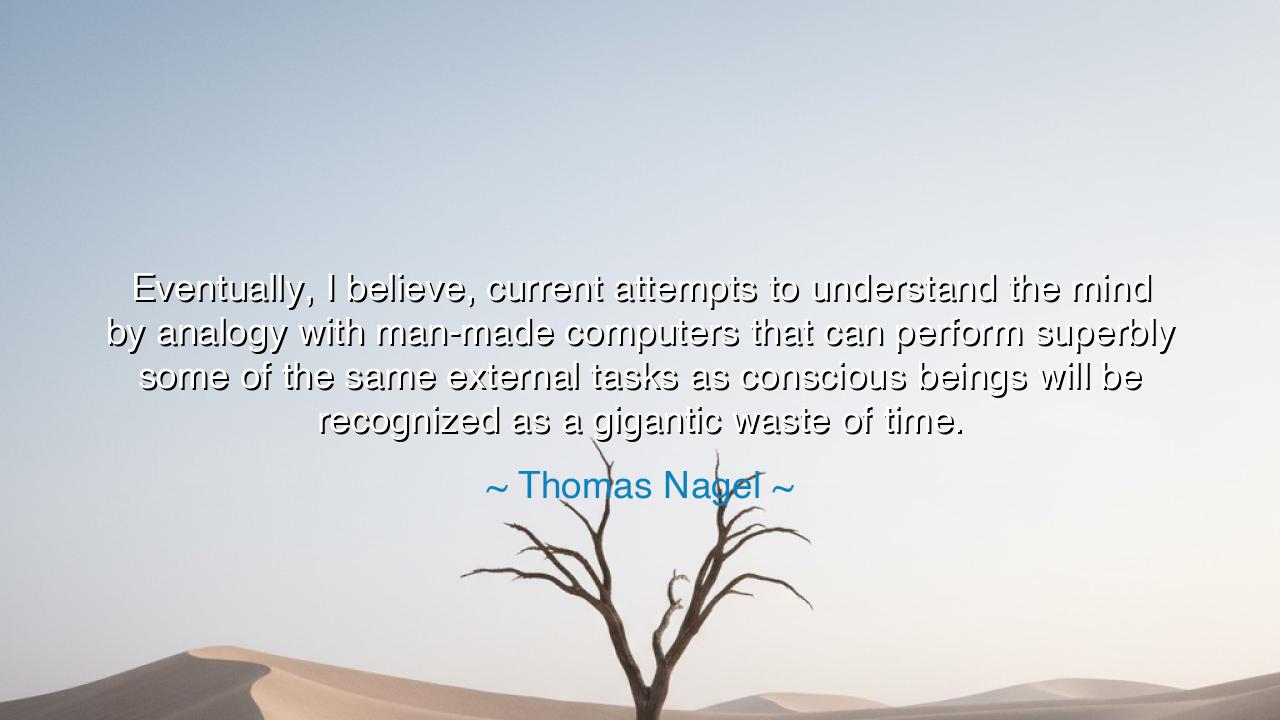
Eventually, I believe, current attempts to understand the mind by
Eventually, I believe, current attempts to understand the mind by analogy with man-made computers that can perform superbly some of the same external tasks as conscious beings will be recognized as a gigantic waste of time.






Listen, O children of the earth, to the wisdom of Thomas Nagel, who speaks with insight and caution about the nature of the mind and the limits of human understanding: "Eventually, I believe, current attempts to understand the mind by analogy with man-made computers that can perform superbly some of the same external tasks as conscious beings will be recognized as a gigantic waste of time." These words, though spoken in our modern age, carry the weight of profound truth about consciousness, the mind, and the limitations of analogies we draw between human beings and the tools we create. Nagel's cautionary statement reminds us that the pursuit of understanding the human mind through the lens of machines, though fascinating, may ultimately miss the deeper truths that lie within the nature of consciousness itself.
In the ancient world, the pursuit of wisdom was not a mere intellectual exercise but a sacred journey to understand the mysteries of life. The great thinkers, like Socrates, Plato, and Aristotle, did not seek to merely explain the mind; they sought to understand the soul—that which transcends the physical and the material. Socrates, in particular, believed that true knowledge came from self-examination, from the inward journey, not from external tools or mechanistic analogies. To compare the mind to a machine, in his eyes, would be to miss the essence of what it means to be human—the deep, ineffable experiences that make us conscious beings.
Consider the story of René Descartes, the philosopher who sought to understand the nature of existence by famously declaring, “I think, therefore I am.” Descartes was not content with analogies; he sought certainty in the conscious mind, acknowledging that the mind could not be reduced to mere mechanical processes. Descartes believed that thought and awareness were distinct from the body’s physical machinery—a belief that set the foundation for modern philosophy. Nagel’s reflection is a continuation of this legacy—a reminder that while we may create machines that mimic some aspects of the mind, they cannot capture the fullness of human consciousness, nor can they explain the experience of being alive.
In today’s world, we have created machines that can perform astonishing tasks. Computers, artificial intelligence, and robots can solve problems, perform calculations, and even mimic human behavior. Yet, Nagel points out that the true nature of consciousness—the subjective experience of being human—cannot be captured by these machines. These tools, as powerful as they are, still lack the depth of experience that we, as conscious beings, possess. The mind, in all its complexity, cannot be reduced to a set of inputs and outputs, no matter how sophisticated the computer may become. The essence of being human is found not in external tasks but in the inner life—the emotions, the self-awareness, and the consciousness that arise within us.
The lesson here, O children of the earth, is one of humility and awareness. As we continue to advance in our understanding of machines and artificial intelligence, we must not forget that the human mind is far more complex than any machine we can create. We must resist the temptation to reduce the mind to mere mechanical processes or logical algorithms. The mind is not simply a machine; it is the seat of consciousness, of experience, and of self-awareness—as vast and mysterious as the very universe itself. Our minds may be able to build machines, but we should not be so quick to equate our own consciousness with that of the tools we create.
Consider the great example of Albert Einstein, who once said, “Imagination is more important than knowledge.” Einstein’s understanding of the mind and the universe was rooted in a deep respect for the mysteries of the universe—mysteries that could not be reduced to equations or mechanical models. He understood that the mind is not a cold, calculating machine, but a vessel of imagination, intuition, and creativity. In this, we find a key truth: while machines may mimic our actions, they cannot mimic our imagination, our dreams, or the subjective experience that shapes us as conscious beings.
The path forward, O seekers of wisdom, is one of recognizing the limits of technology and embracing the mysteries of the mind. Nagel’s words remind us that while we can marvel at the feats of artificial intelligence, we must not lose sight of the unique quality of human consciousness. Machines can perform tasks, but they cannot experience life. They can calculate and analyze, but they cannot dream, feel, or think as humans do. Let us not forget the depth of our own experience, and let us seek to understand the mind not through the lens of technology, but through the lens of humanity—in all its complexity, mystery, and beauty.
In your own lives, O seekers, remember this: while technology may be a tool to help us solve problems and navigate the world, it is not the source of our true wisdom. Seek the mysteries of the mind, honor the depth of your consciousness, and understand that the subjective experience of being alive is something that no machine can ever replicate. In this, we find the true value of human existence—not in the tasks we perform, but in the richness of our experience and the wonder of simply being. Let the machines serve as tools, but let the human mind remain a sanctuary of creativity, awareness, and mystery.






AAdministratorAdministrator
Welcome, honored guests. Please leave a comment, we will respond soon